- Home
- Gerald Hammond
In Camera
In Camera Read online
IN CAMERA
Gerald Hammond
© Gerald Hammond 1991
Gerald Hammond has asserted his rights under the Copyright, Design and Patents Act, 1988, to be identified as the author of this work.
First published in 1991 by Macmillan London Limited.
This edition published in 2017 by Endeavour Press Ltd.
Table of Contents
Chapter One
Chapter Two
Chapter Three
Chapter Four
Chapter Five
Chapter Six
Chapter Seven
Chapter Eight
Chapter Nine
Author’s Note
Chapter One
If Keith Calder had not had such a low threshold of boredom, or even if he had been quite sober that fine Saturday afternoon, this story might have taken a different course.
But his partner, Wallace James, had been removed, protesting, for a tour of visits to his wife’s relatives. Molly, Keith’s own wife, had been called to the sick-bed of an aged aunt. Deborah, his daughter, was away, competing in the British Ladies’ Skeet Championship, while Keith, who would dearly have loved to go with her as coach and camp follower, was left to mind the shop.
In the Square at Newton Lauder, the gunshop and fishing tackle emporium had provided Keith with a good living for more than twenty years, but he detested being stuck behind the counter. Usually, the shop took almost the place of a club where those devoted to the pursuit of bird, beast or fish could meet up and exchange lies about their exploits. But this was the dead season. Summer visitors up for the fishing were more inclined to go and fish than to linger and talk about it, while those locals who should have been bringing in their guns for between-season servicing were, as usual, waiting until the last minute before demanding instant attention and priority, each over the other. To add insult to injury, the weather was fine and the pigeon were dropping in to laid barley. Even from the Square, occasional shots could be heard as the local pigeon-shooters came to terms with the elusive birds. In short, as Keith told his brother-in-law when they met over a bar lunch in the hotel, if God was going to give the year an enema, this was when he would insert the tube. They exchanged large, malt whiskies and toasted the coming season.
Keith crossed the Square and re-opened the shop, feeling slightly less put-upon.
Almost on his heels, a visitor arrived. Keith looked up with relief from some invoices. The arrival was a thin man with a drooping moustache, dressed, despite the weather, in heavy tweeds and a fore-and-aft hat. He might have been a fisherman in search of tackle or a deerstalker stocking up with cartridges for the hill, but Keith recognised the stooped posture, worn hands and narrowed eyes of one who had spent much of his life at the workbench. This would be the visitor whom he had been expecting at some unspecified time in the afternoon.
‘Mr Hall?’ he said.
‘Robert Hall. You’d be Keith Calder?’ The accent was unmistakably Midlands, probably Birmimgham.
‘I would.’ They shook hands. ‘I’m on my own this afternoon,’ Keith said, ‘so we’ll have to talk here. I hope we’ll be interrupted by a rush of customers but I’m not counting on it.’
Hall smiled nervously, showing uneven teeth. ‘I understand.’
‘Let’s sit down.’ There were two bentwood chairs for customers. ‘We’re quiet just now,’ Keith said, ‘but I’ll be rushed off my feet soon. The managing director of Gunsport thought that he’d pulled off a coup with a bulk purchase of twelve-bore semi-autos, but when they arrived they all had five-shot magazines.’
Hall nodded. Under changed legislation, five-shot semi-automatic shotguns would be virtually unsellable.
‘Meantime,’ Keith said, ‘the importer went bust and decamped – which, of course, is how he’d managed to give Gunsport a thief’s bargain in the first place. The manufacturer doesn’t want to know, and quoted a crazy price for modification and re-proof. I’ve got the contract for blocking the magazines down to two-shot, starting in about three weeks at the latest. I couldn’t handle the whole of it, even if I had nothing else to do.’
A few minutes spent in discussing the technicalities of carrying out the modification to the satisfaction of the Proof House were enough to convince Keith that Hall could do the job.
‘Where would I be working?’ Hall asked. He glanced towards the back shop.
Keith smiled. ‘I used to work there,’ he said, ‘but we need it all for storage. I do my gunsmithing at home. I’ve a workbench upstairs, but there’s quite a good little machine-shop set up in a former coach-house. It’s about two miles north of the town. You have a car?’
Hall shook his head. ‘I don’t drive. I came through by train and bus. But it sounds like a pleasant walk, morning and evening. I was put in touch with a Mrs Scott in the town. She told me on the phone that there was a room for me if I wanted it.’
‘You’re available soon?’
‘Right away, if you want me.’
‘Would you have any objection to serving in the shop occasionally?’
Hall glanced round the racked guns, fishing rods, waders, decoys and shelf after shelf of cartridges and small gear. He smiled again, more confidently. ‘Lord, no! I did a lot of that while I was with Alderkin’s. I shoot a little and fish a lot and I get on with people.’
Keith felt a pleasurable glow as he pictured himself freed to get back to his workbench among the antique guns, making a foray with Deborah to decoy pigeons whenever the mood took him. He had already taken up Hall’s earlier references and received glowing reports of him. There was no reason not to strike an immediate deal – except that Keith was in no hurry to be left idle in the shop, kicking his heels in the faint hope that some small boy would come in for a penn’orth of maggots.
Keith glanced down at the curriculum vitae that Hall had sent him. ‘Bruce Ailmer was your most recent employer but I notice that you didn’t give his name as a reference. Why did you leave?’
Hall looked uncomfortable. ‘Personal reasons,’ he said.
Keith felt a stirring of sympathy. Bruce Ailmer of Dundee was a gunsmith in a fair way of business, pulling in more than his fair share of high-quality work, but he was not an easy man to get along with.
‘He was your last employer,’ Keith said. ‘Is there any reason why I shouldn’t consult him?’
‘I’d very much rather that you didn’t.’
Again, Keith nearly left it there. Only his reluctance to break off human contact spurred him on. ‘Then I think you’d better tell me about your “personal reasons”,’ he said.
Hall put up a hand to his moustache and then touched an eyebrow. ‘Mr Ailmer can be difficult. He has a temper. We just didn’t get along. Can’t we leave it at that?’ He looked down at his hands.
Keith felt the faint prickling up his spine that always warned him of something untoward lurking in the background. Hall was uneasy, evasive, possibly lying. Keith felt curiosity stir in him – much, he thought, as a mother would feel a baby stir. ‘You must see that we can’t,’ he said. ‘The job’s yours if you want it, but first you’ll have to convince me that you left Ailmer for a good reason. For all I know . . .’ He left the implication hanging in the air.
‘But I’ve explained—’
‘You’re hiding something,’ Keith said.
A woman’s heels clicked by outside and a car started up in the Square, but it was very quiet in the shop.
Hall looked up suddenly and met Keith’s eye. ‘All right,’ he said. ‘I’ll tell you. In confidence?’
‘That would have to depend. I can’t give a blanket promise. But I can hold my tongue when there’s no reason to let go of it.’
Hall’s drooping frame sagged further. ‘I suppose so. What I told you was
true enough. Bruce Ailmer’s a scratchy sod. He’ll find fault with perfectly good work, just to give himself the pleasure of chewing off an employee. I think he enjoys the feeling of superiority. But it was a good enough job, as jobs go.’
‘So what went wrong?’ Keith asked.
‘Nothing went wrong as such.’
‘But?’
‘Yes, there was a but. Late last week, a woman went in to see the boss – a hag of around fifty, stout but hatchet-faced, with bleached hair and a voice that could have reamed the pitting out of a gun-barrel. He took her into his own room, which is partitioned off from the other three or four workplaces.
‘I’d been restoring a pair of barrels. The blueing tank’s in a small cellar beneath Ailmer’s room and there’s not much more than floorboards in between. But there’s no window to his room, so he usually has a ventilation fan switched on. He doesn’t realise it, but the fan running nearby masks the sound of anybody working in the cellar below, while somebody in the cellar can hear voices above.
‘I wasn’t listening particularly. In fact, I don’t remember hearing a single word Mr Ailmer said. But the woman’s voice was penetrating. I only made out a word or two until I heard her say “. . . converted to fully automatic . . .” and something about a “banana clip”. That caught my attention all right.’
‘It would,’ Keith said with feeling. ‘Did you hear anything else?’
‘Not a lot, but what I did hear scared me shitless. Something about “. . . into the case all right if you shorten the barrel.” And “. . . trigger on the outside.” Then, just as she was leaving, I heard her quite clearly. She said, “Payment in American dollars.”’
An elderly man chose that moment to come into the shop in search of braided fishing-line. Keith dealt with him expeditiously and sat down again. ‘You realise what you were listening to?’ he asked.
‘I tried not to believe it,’ Hall said.
Keith shook his head. ‘They had to be talking about an assassination weapon. Turning a rifle into a submachine-gun and fitting it into some sort of case with a trigger accessible from outside.’
‘That’s what I was afraid of. I tried to think of other explanations to fit the facts. Meanwhile, the boss began staying late and working in his own room. Nothing unusual about that, except that he gave me no idea what he was working on, and it didn’t seem to be any of the jobs which were on the books.’
‘So, the next time he spoke an unkind word to you, you made it your excuse to quit?’ Keith guessed.
‘Not immediately,’ Hall said. ‘Two days later, a turn-screw rolled off the edge and down the back of the cupboard beside my bench. I fished for it with a piece of wire . . . and brought out a section of rifle-barrel complete with foresight. And it didn’t come off a model that had been worked on during my time there. From the taper and the gold bead foresight it reminded me of the Ruger ten-twenty-two Sporter.’
Keith shook his head. ‘Not the Sporter. It’d be the carbine. No point chopping up the more expensive model when the cheaper one would do the same job. American again, you’ll note.’
‘Again?’
‘She mentioned dollars. Have you been to the police?’
It was Hall’s turn for a headshake. ‘At first, I was hesitating. If the job turned out to be legitimate – for export with proper paperwork, or for the Government – I could have done myself a whole lot of no good, running to the police to tell tales about my employer. But after I found that piece of rifle-barrel I got really worried. At the time, there was only one other gunsmith working for Ailmer; and he was off work with a hernia. At best, it looked as though Ailmer was preparing to shift the blame onto me if the job was ever traced back to his workshop. At worst, I was going to be set up. God alone knows what other evidence might be hidden about the place.’
‘What did you do with the piece of barrel?’ Keith asked.
‘Hid it under the blueing tank. Then I let one of the usual squabbles blow up into a real row, chucked in my resignation and got the hell out of there. That was the day your advertisement appeared. I phoned straight away. I . . . I’d just as soon that Bruce Ailmer didn’t know where I’d gone. If he finds that I’ve moved the evidence and starts putting two and two together . . .’
‘If he does that,’ Keith said, frowning, ‘the first thing he’ll do is to look through the papers to see who was advertising for a gunsmith around that time. The job’s yours if you still want it. But I don’t like the idea of you walking along the main road twice a day. There are some cottages at the market garden behind my house and I’ll ask about a room there. Come to the shop here on Monday morning. Is that soon enough?’
The prospect of a secure future seemed to put new strength into Robert Hall’s backbone. He sat up straighter. ‘No problem. I left my luggage in Edinburgh. I can spend tomorrow with a friend there and come out on the first bus on Monday.’
‘But,’ Keith said firmly, ‘you can’t just put it all out of your mind and forget it. You’ll have to go to the police. There’s an assassination being planned. We don’t know who the target is. It may only be a politician but it could be somebody important.’ Keith paused. Something about his last sentence had seemed out of key; but no, it made sense. ‘You’ll be in a much stronger position, if you really are being earmarked to carry the can, if you get to the cops first. Conversely, imagine the murder taking place and it emerges that you and I knew about the weapon. Both our heads would be on the block. Leave it with me for the moment, but be prepared to tell it all on Monday.’
‘I suppose you’re right,’ Hall said sadly. ‘In principle, I know you are. But the thought of telling it all to the police and then appearing in court and having to stand up to cross-examination makes my guts feel loose.’
‘If it goes that length, tell the absolute truth and stick to it and you’ll be all right. They aren’t monsters. Some of the police and even one or two lawyers really do have only one head each – my daughter’s boyfriend for one. He’s the local Firearms Officer, so he makes a good starting-point. I’ll give him a ring.’
Hall got out of his chair and shook hands firmly. ‘I feel better now,’ he said. ‘You were right and you’ve shown me what to do.’
He left to catch the bus back to Edinburgh and Keith went to the phone.
*
Sergeant Ian Fellowes was another who suffered from Saturday blues. Neither in his function as a detective sergeant, responsible to Edinburgh for the investigation of minor crime in Newton Lauder, nor as the local Firearms Officer was there anything more than the most mundane of routine duties to occupy his attention; but the roster insisted that he should be on duty, so on duty he was.
Keith’s phone-call put an end to boredom for good and all. He quitted his small office with relief, took a short cut through the Town Hall, crossed the Square to the old-fashioned frontage of the gunshop and entered, smiling. He liked Keith. He would have liked the older man even if Keith had not managed to father the most companionable, argumentative and generally desirable girl in the western hemisphere.
A brief spurt of business – a small boy wanting catapult rubber and a local keeper in search of decoy sticks – had died down. The shop was empty of customers again. Keith’s news soon wiped away the smile.
‘Where’s this man Hall?’ Ian asked. ‘I’d better see him.’
‘Gone back to Edinburgh to collect his luggage,’ Keith said. ‘You’ll get him on Monday morning.’
Ian Fellowes looked at the man who might some day be his father-in-law with less than his usual affection. ‘For God’s sake!’ he said. ‘Couldn’t you have kept him here?’
‘There’s no tearing hurry. One man, working on his own and running a business at the same time, won’t turn a rather mundane rifle into a sophisticated assassination weapon overnight.’
‘That could depend how polished a job he was making of it,’ Ian pointed out.
‘If you’re in any doubt, you could have Bob Hall lifted off the bus. Or you c
ould phone Dundee. Tell them that you’ve had a tip-off. They could raid Ailmer’s workshop,’ Keith suggested hopefully. He had never liked Bruce Ailmer and the removal of a serious element of competition was an attractive prospect.
The Sergeant looked doubtful. ‘On the basis of a scrap of rifle-barrel and what you tell me you’ve deduced from a few words overheard by some Nervous Nelly who I’ve been denied the chance of questioning? No. This goes through channels,’ he said. ‘The one advantage of being a junior officer is that you can pass the buck upstairs and let your superiors lay themselves open to ridicule and mirth.’
‘Or grab the credit, if it averts an attempted coup.’
‘They’d grab it anyway.’
‘That’s true,’ Keith said.
The telephone made bird-like noises. Keith answered it. Deborah was calling. She had finished as runner-up after a shoot-off and was on the way home.
‘Tell her, “Well done!” from me,’ Ian said.
Keith relayed the message.
‘Thanks. I’ve spoken to Mum,’ Deborah said. ‘She was trying to reach you but you must have gone to lunch. Somebody with an American accent wanted to know when you’d be home.’
‘I’ve had a bellyful of our transatlantic cousins for the moment,’ Keith said.
They disconnected.
‘What went wrong in the shoot-off?’ Ian asked.
‘A sudden gust of wind, she said. Never mind. There’s always next year.’
The danger of a coup d’état suddenly seemed less important. They discussed the prospects for next year for a few minutes.
‘I’d better get back and put a report on the wire,’ Ian said at last. ‘I’ll have to put the blame on you for letting the witness buzz off. You don’t mind?’
‘Not in the least,’ Keith said. ‘Be my guest. They’ll believe anything of me. That bugger McHarg thinks that I invented original sin.’
Ian Fellowes said nothing. Keith’s iniquity was the one subject on which he sometimes found himself in agreement with his seniors.

 Home to Roost
Home to Roost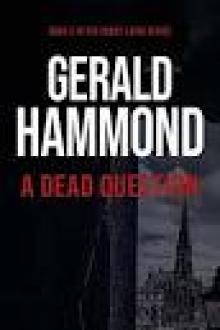 A Dead Question
A Dead Question Twice Bitten
Twice Bitten The Curse of the Cockers
The Curse of the Cockers In Loving Memory
In Loving Memory Illegal Tender (Three Oaks Book 12)
Illegal Tender (Three Oaks Book 12) Cold Relations (Honey Laird Book 1)
Cold Relations (Honey Laird Book 1)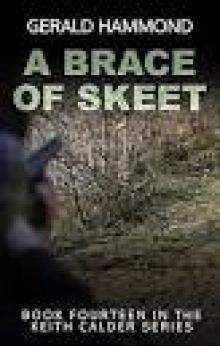 A Brace of Skeet
A Brace of Skeet Silver City Scandal
Silver City Scandal Sauce For the Pigeon
Sauce For the Pigeon Cold Relations
Cold Relations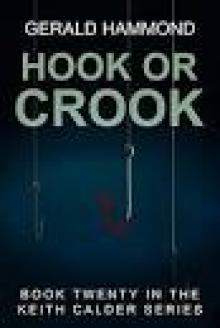 Hook or Crook
Hook or Crook The Curse of the Cockers (Three Oaks Book 5)
The Curse of the Cockers (Three Oaks Book 5) Snatch Crop
Snatch Crop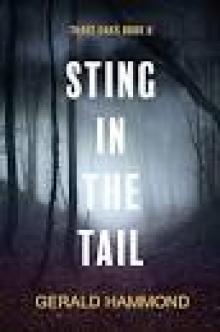 Sting in the Tail (Three Oaks Book 6)
Sting in the Tail (Three Oaks Book 6)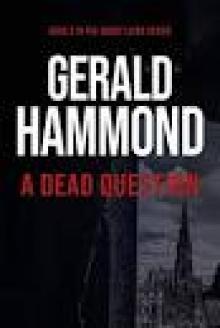 A Dead Question (Honey Laird Book 2)
A Dead Question (Honey Laird Book 2) In Loving Memory (Honey Laird Book 3)
In Loving Memory (Honey Laird Book 3) Thin Air
Thin Air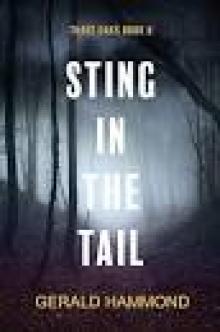 Sting in the Tail
Sting in the Tail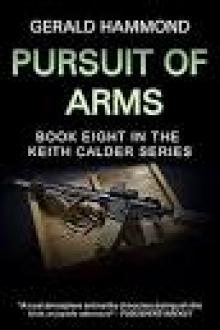 Pursuit of Arms
Pursuit of Arms The Game
The Game Give a Dog a Name (Three Oaks Book 4)
Give a Dog a Name (Three Oaks Book 4) Fair Game
Fair Game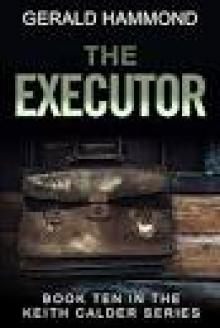 The Executor (Keith Calder Book 10)
The Executor (Keith Calder Book 10) Whose Dog Are You? (Three Oaks Book 2)
Whose Dog Are You? (Three Oaks Book 2) Mad Dogs and Scotsmen (Three Oaks Book 7)
Mad Dogs and Scotsmen (Three Oaks Book 7) Cousin Once Removed
Cousin Once Removed The Worried Widow
The Worried Widow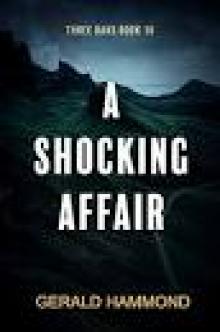 A Shocking Affair
A Shocking Affair Dead Weight (Three Oaks Book 11)
Dead Weight (Three Oaks Book 11) Whose Dog Are You
Whose Dog Are You The Revenge Game
The Revenge Game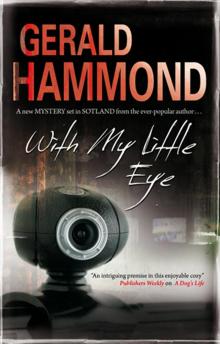 With My Little Eye
With My Little Eye Doghouse (Three Oaks Book 3)
Doghouse (Three Oaks Book 3)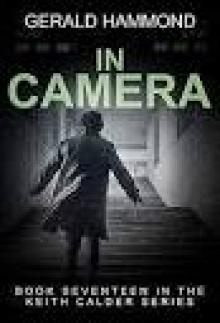 In Camera
In Camera Bloodlines (Three Oaks Book 8)
Bloodlines (Three Oaks Book 8)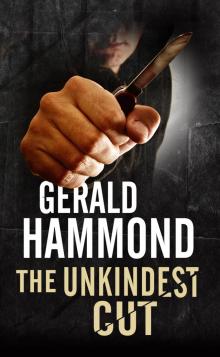 The Unkindest Cut
The Unkindest Cut